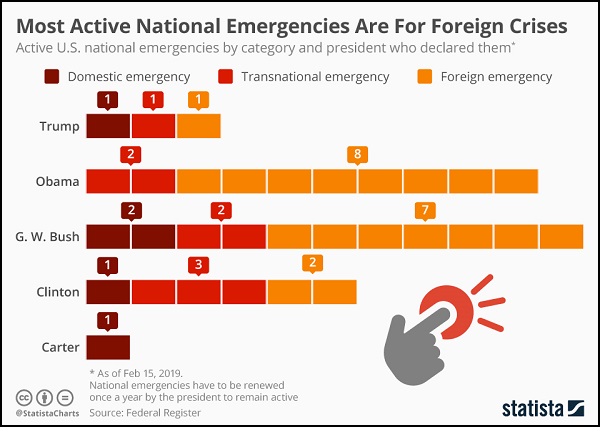
|
|

|
|
| April 20, 2024 |
|
Trump declares emergency for wall funds denied by Congress 
WASHINGTON--President Trump on Friday declared the southern border of the United States to be a national emergency, catapulting the country into uncertain legal and political battles as he seeks to fulfill a campaign promise that eluded him for two years.
He made the designation in an attempt to redirect taxpayer money from other accounts and use it to erect more than 230 miles of barriers along the U.S.-Mexico border. But Trump anticipates a flurry of legal challenges that will eventually be decided by the Supreme Court. Democrats are trying to paint the action as evidence of a rogue president who has finally gone too far and vowed to stop him. Trump’s announcement capped a frenetic two-month period that included the longest government shutdown in U.S. history at 35 days, the reemergence of Democrats as a political force, and a Republican Party caught between taking signals from Trump and bucking his unconventional impulses. It also begins a new phase of his presidency that will test the separation of powers, as he sidesteps Congress despite Republicans urging restraint. During a meandering 50-minute Rose Garden news conference, Trump offered little empirical evidence to back up his assertion that there was a crisis on the border requiring an extraordinary response. Instead, he invoked hyperbolic, campaign-style rhetoric about lawlessness that he said only walls could suitably address. “We’re talking about an invasion of our country with drugs, with human traffickers, with all types of criminals and gangs,” he said. He used the word “invasion” seven times. He later said the emergency declaration wasn’t urgent, but rather expedient, as it would help him build a wall more quickly than Congress would allow. “I didn’t need to do this, but I’d rather do it much faster,” he said. Democrats and the American Civil Liberties Union mapped out the ways they would try to block Trump’s wall before it was completed. House Judiciary Committee Chairman Jerrold Nadler (D-N.Y.) said he would summon White House counsel Pat Cipollone to Capitol Hill to explain the White House’s rationale. California Attorney General Xavier Becerra, a Democrat, said he planned to work with other states to take legal action against the White House. The ACLU said it was preparing a lawsuit of its own, arguing Trump cannot legally redirect taxpayer money during an “emergency” unless it's for military construction projects that support the armed forces. Democrats and several Republicans predicted a two-pronged response to the declaration: One, having Congress vote to reject it in the coming weeks, and two, suing Trump — or at least aiding other parties who attempt to intervene. “The president’s actions clearly violate the Congress’s exclusive power of the purse, which our Founders enshrined in the Constitution,” House Speaker Nancy Pelosi (D-Calif.) and Senate Minority Leader Charles E. Schumer (D-N.Y.) said in a joint statement. “The Congress will defend our constitutional authorities in the Congress, in the Courts, and in the public, using every remedy available.” Most notably, Pelosi and Schumer said, “We call upon our Republican colleagues to join us to defend the Constitution.” Republicans are divided over Trump’s declaration, with many unnerved over what they see as an executive power grab while others are unwilling to challenge the president ahead of 2020 presidential and congressional elections. White House officials want to rush to approve projects and reallocate money as quickly as possible, but no timeline has been given. Part of their strategy is to try to use “eminent domain” to seize private property along the border, particularly in Texas, where they want to install parts of the barrier. This is expected to open another round of legal challenges from private landowners. Other parts of the approach are equally unclear. White House officials have not said, for example, how they plan to solicit bids on the projects or what type of process they will follow. Congressional Democrats and some state leaders, meanwhile, have vowed to try to stop the work before it can even begin. White House officials plan to use $8 billion to build new fencing that they believe will block or discourage a wide range of immigrants. Of that money, $1.375 billion was approved by Congress on Thursday, and it can be used for 55 miles of “pedestrian fencing” in the Rio Grande Valley in Texas. The White House plans to use another $600 million from the Treasury Department’s forfeiture funds account, which is money that is seized by the federal government from a range of illicit activities. An additional $2.5 billion would be redirected from a Pentagon program for countering drug activities, and a final $3.6 billion would be moved from military construction accounts. It's that final pot of money that White House officials said required the national emergency declaration, as the White House is generally barred from moving money from one account to another without congressional approval. As part of the national emergency declaration, Trump signed a $333 billion spending bill that funds many government operations through September. This averted a government shutdown that would have begun Saturday. (Source: The Washington Post) Story Date: February 17, 2019
|